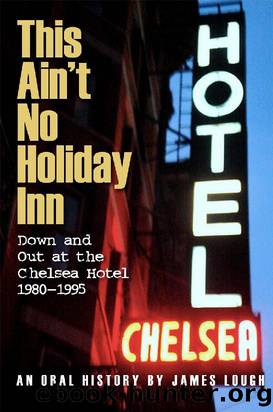This Ain't No Holiday Inn by James Lough

Author:James Lough [Lough, James]
Language: eng
Format: epub, mobi
Publisher: Schaffner Press, Inc.
Published: 2013-08-15T07:00:00+00:00
A re-invented Dee Dee Ramone (left) and Robert Campbell, with the Dee Dee Ramone group on their debut gig at the Continental Divide.
CHAPTER 5
Getting By
Perhaps I would have to take a job—a most depressing thought.
— HENRY MILLER, The Air-Conditioned Nightmare
The thorny predicament of making a living has always dogged Bohemian artists. The Beat poet-turned-affluent-entrepreneur Lawrence Ferlinghetti defined Bohemians as “nonconformists who don’t lead a nine-to-five life.”79 Some Bohemians don’t want the nine-to-five life because they find it too constricting, others because they’re lazy, and still others because they haven’t the confidence to enter the mainstream life of working for a living. This is why Stanley Bard was such a godsend to artists. But Ferlinghetti failed to mention the main reason why Bohemian artists don’t want a full-time job: they already have one.
For artists to improve at their craft and be successful, they have to work at their art for hours every day. Having a full-time job, then, means having two jobs, not a life many would relish. Most of us average full-time drones come home tired from our full day’s work. To begin our second job with a pen, a paintbrush, a guitar or a camera requires concentration and energy, two resources that day jobs have a way of devouring. It’s hard enough to keep on top of life’s quotidian routines: laundry, groceries and housework. And the fact that most aspiring artists make little or no money from their creative work runs them through a mill of self-doubt, frustration and depression. After a hard day at the job, it’s easier to crack a beer and watch TV than inspire yourself to make art.
One option for artists is to work half-time at their day jobs and half-time at their real vocations, their art. This is also easier said than done. Most half-time work pays peanuts, relegating artists to poverty, and here they are again, back to being starving Bohemian artists. This is why the Chelsea Hotel, with Stanley Bard at the helm, proved so invaluable. He kept his rooms affordable enough for artists who had committed themselves to Mistress Poverty, for a while at least, as they worked at making it big.
Even the more well-known and accomplished artists like the painter and printmaker Bernard Childs didn’t have much money.
JUDITH CHILDS
It was a funny thing, because my husband Bernard was a really distinguished artist—certainly known to the cognoscenti—but we never made a whole lot of money. We survived—we lived on what he made—but it takes years for this stuff to fall together. Suddenly, it becomes the time when something catches on. We sold a lot of work, obviously. We couldn’t have lived on it otherwise. But we lived by it, so when we had money, we would buy a good bottle of wine or go to Puerto Rico, and we paid attention and lived quite meagerly, except for expensive paints. I don’t know how we did it! I still do it.
The less successful artists, or those just setting off down the path to find their creative voices, had it at least as hard.
Download
This site does not store any files on its server. We only index and link to content provided by other sites. Please contact the content providers to delete copyright contents if any and email us, we'll remove relevant links or contents immediately.
| Africa | Americas |
| Arctic & Antarctica | Asia |
| Australia & Oceania | Europe |
| Middle East | Russia |
| United States | World |
| Ancient Civilizations | Military |
| Historical Study & Educational Resources |
In Cold Blood by Truman Capote(2684)
Steve Jobs by Walter Isaacson(2414)
All the President's Men by Carl Bernstein & Bob Woodward(1960)
Lonely Planet New York City by Lonely Planet(1843)
The Murder of Marilyn Monroe by Jay Margolis(1741)
The Room Where It Happened by John Bolton;(1719)
The Poisoner's Handbook by Deborah Blum(1659)
And the Band Played On by Randy Shilts(1615)
Lincoln by David Herbert Donald(1611)
The Innovators by Walter Isaacson(1586)
The Innovators: How a Group of Hackers, Geniuses, and Geeks Created the Digital Revolution by Walter Isaacson(1501)
A Colony in a Nation by Chris Hayes(1497)
Under the Banner of Heaven: A Story of Violent Faith by Jon Krakauer(1411)
The Unsettlers by Mark Sundeen(1339)
Amelia Earhart by Doris L. Rich(1336)
Birdmen by Lawrence Goldstone(1335)
Decision Points by George W. Bush(1250)
Dirt by Bill Buford(1231)
Zeitoun by Dave Eggers(1222)
